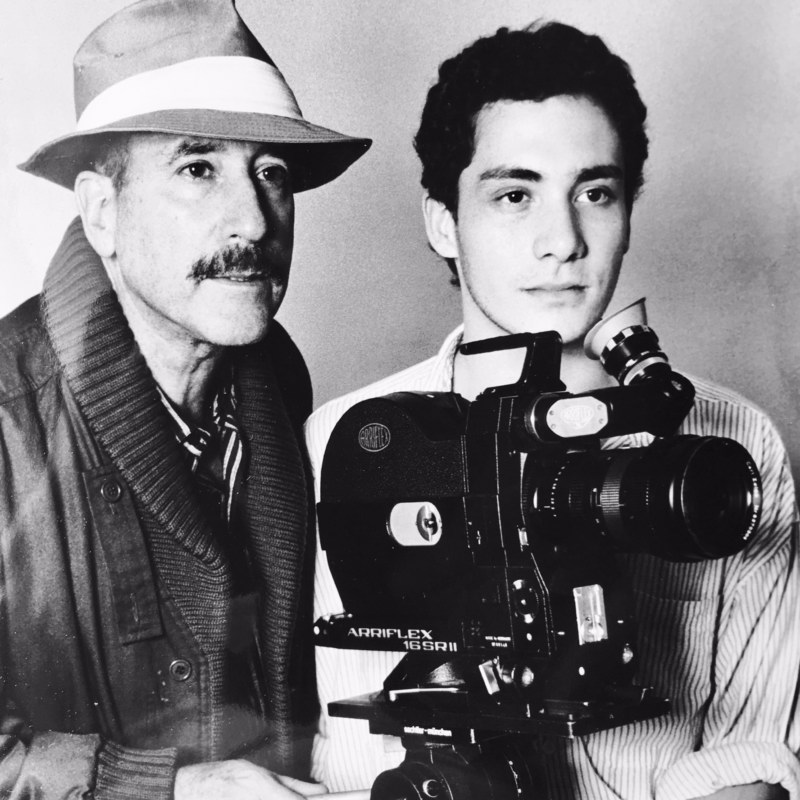When I was sixteen, I read the autobiography of Oscar award-winning cinematographer Nestor Almendros (1930-1992), Days of a Cameraman, and it changed my life. Little did I know then that not only I would have the chance to meet this amazingly talented man, but also to work with him three years later on one of his personal projects, the documentary Nobody Listened.
Nestor became known for mastering the use of natural light. He made beautiful films like Days of Heaven and Sophie’s Choice and worked with French New Wave directors such as Francois Truffaut and Eric Rohmer. What made his life story so fascinating to me was how little he cared about the tools and technology of his craft and how much he cared about narrative, literature and art. He had the ability to deliver great results by working efficiently and making sure the set belonged to the director rather than to him. Nestor was the kind of collaborator any director would dream of and he was pursued by some of the best. He had an enormous cultural knowledge and eclectic taste. At sixteen, I learned from him that the toys of our trade means nothing if we don’t master the skill of communication. Nestor was a master communicator. He knew how to share his knowledge and how to be a great collaborator. Because of him I always remember that cinematography is the art of communication, not just of creating beautiful images.
A year after reading his book, I couldn’t believe my eyes when I saw that Nestor was shooting an interview for a documentary he was co-directing in the living room of my parent’s apartment in Madrid. It was the first time I got to see him in action. Nestor had a passion for human rights and for Cuba, where he had once lived in his youth. Once he became famous, he decided to devote a good deal of his time to denouncing the injustices against political dissidents, gays and anyone else who didn’t fit the tastes of the Cuban Revolution. Hence, when I met him in Madrid, he was co-directing a documentary titled Improper Conduct with Orlando Jimenez Leal, and was shooting an interview with Armando Valladeres, a famous Cuban political dissident who had spent many years in prison and had been recently released. While pretending not to be in awe in his presence, I quickly saw how fast he looked over the space to check the natural lighting, the windows and the backgrounds, before deciding where to put the camera. In a matter of a few minutes he chose the best angle, reinforced the key lighting with a Lowell softlight kit and put his 16mm Aaton camera to work right away. He didn’t waste precious time on his craft. Rather, he gave it to the subject in front of the camera. There are a few lessons from that day that I will take with me wherever I go: 1 - Take advantage of your environment before putting out any lights and 2 – Time spent lighting could be robbed from what happens in front of the lens.
Nestor stayed in my parents’ home for only a couple of hours and it wouldn’t be until a few years later when I was a student in New York City that I would see him again. He knew I wanted to be a DP based on that first meeting in Madrid and was working on another documentary with filmmaker Jorge Ulla about Cuba entitled Nobody Listened. He needed a first AC for a few interviews and I volunteered right away. This time around I had a chance to talk with him and learned that his favorite DP was also mine at the time! Sven Nykvist, Ingmar Bergman’s cinematographer for such beautiful films as Cries and Whispers and Fanny and Alexander. Once again, I saw how Nestor would carefully inspect the natural lighting and open shades to cast the sun and find the right spots to shoot. He never wasted a second and I had to be at the top of my game because he was also impatient if I didn’t move fast with the camera. He enjoyed conversations about books and movies. I also saw him reject an offer by Woody Allen to shoot one of his films because he was shooting this small documentary. I could tell that Nestor was a very committed man. I asked him how he chose which projects to do and he replied that first and foremost for him was finding out who the director was. For him, the script was secondary. He told me he was too old to deal with unpleasant directors and had rejected work opportunities with directors such as William Friedkin due to their reputations on set. He liked to repeat collaborations and had a close working relationship with Robert Altman, among others.
Nestor treasured his life in New York and was never interested in moving to Hollywood. Interestingly, at that time I was looking to do an MFA and I had been accepted at NYU and AFI. Nestor recommended that I move to LA to pursue my career as a DP, as it was a better place to learn my craft than in Manhattan. I followed his advice, and once again he changed my life.
He was generous, demanding, devoted to his causes, a great conversationalist, an intellectual and a good friend that left a great book and some beautiful feature films and documentaries to posterity. I will forever be grateful for the time I spent with him and for everything he taught me.





